Home › Forums › Saffers describe their harrowing escape from war-torn Sudan and adjusting to new life back home
- This topic is empty.
-
AuthorPosts
-
2023-05-23 at 14:02 #405823
 Nat QuinnKeymaster
Nat QuinnKeymasterJust over a month has passed since war broke out in Sudan’s capital Khartoum between rival military forces. Daily Maverick spoke to South Africans about their desperate flight from Sudan, across the Egyptian border, and back home.
In the heat of battle in Sudan a few weeks ago, it was a sudden scramble to find refuge. South Africans Ash Ramraj and Ilse and Adam Young were among those trying to flee from the capital, Khartoum.
On 15 April, fighting broke out in Khartoum between the government-backed Sudanese Armed Forces (SAF) and paramilitary Rapid Support Forces (RSF). A transition to civilian rule was designed to have the RSF absorbed by the SAF, yet the RSF quickly took control of sites across Khartoum, and by the third day of conflict, the United Nations was reporting 400 people dead and 3,500 injured.
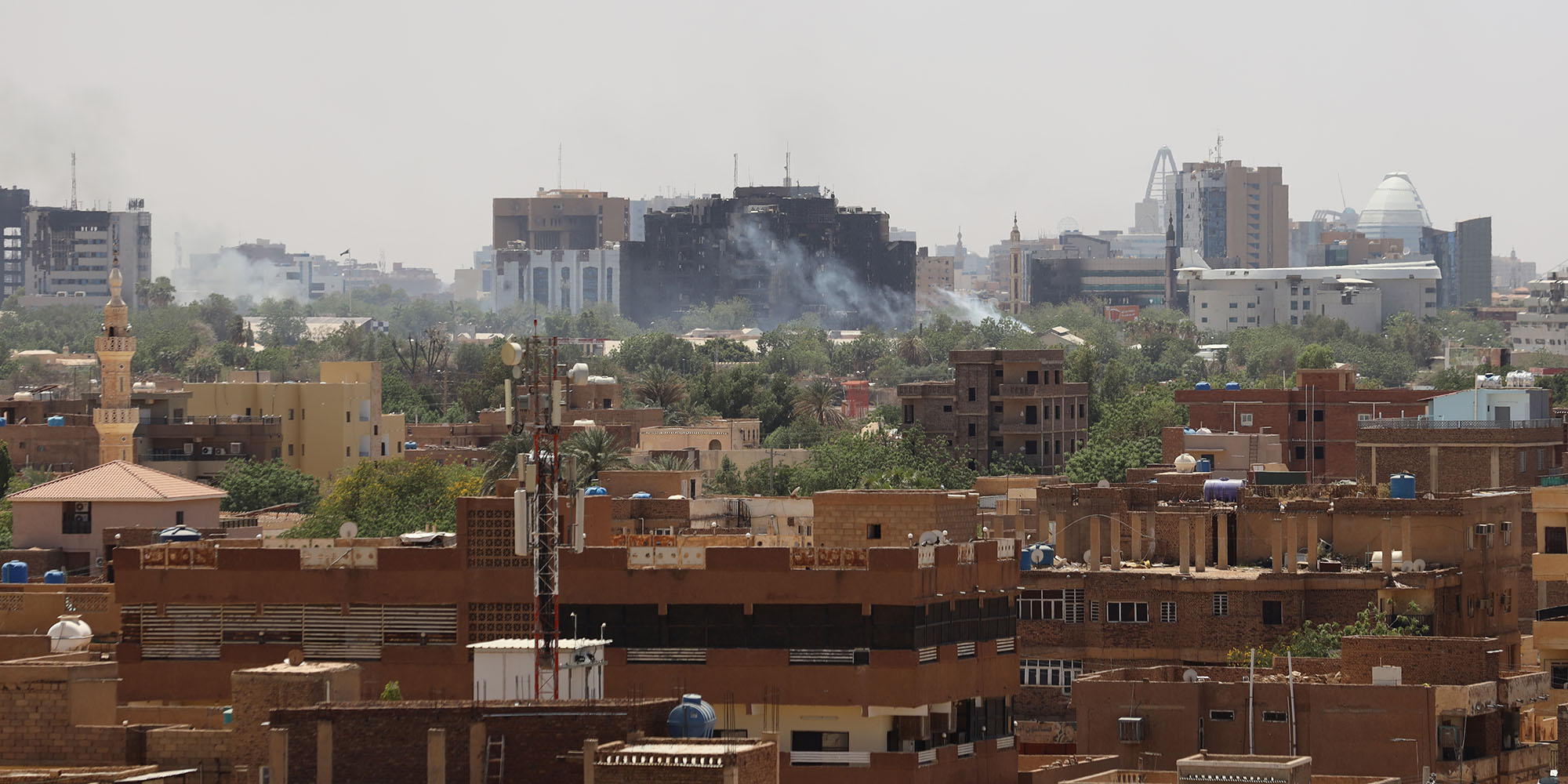
Smoke rises over the city during the ongoing fighting between Sudanese army and paramilitaries of the Rapid Support Forces (RSF) in Khartoum, Sudan, 19 April 2023. (Photo: EPA-EFE / STR)
In the weeks following the RSF’s first military action, the South African Department of International Relations and Cooperation (Dirco) and the humanitarian organisation Gift of the Givers worked to evacuate South Africans from the increasingly tense nation.
At that time, three evacuation buses were arranged to transport South Africans to the Egyptian city of Aswan, and then to fly to South Africa. More than 70 South Africans were safely taken out of Sudan.
On Sunday and Monday this week, the SAF launched air strikes on the streets of Khartoum in an effort to drive out RSF forces. The strikes were targeting areas under RSF control and RSF-marked vehicles.
More than 700 people are reported dead in total, and more than 1.1 million people are displaced from the conflict.
The first truce came with a mutual ceasefire agreement late on Monday.
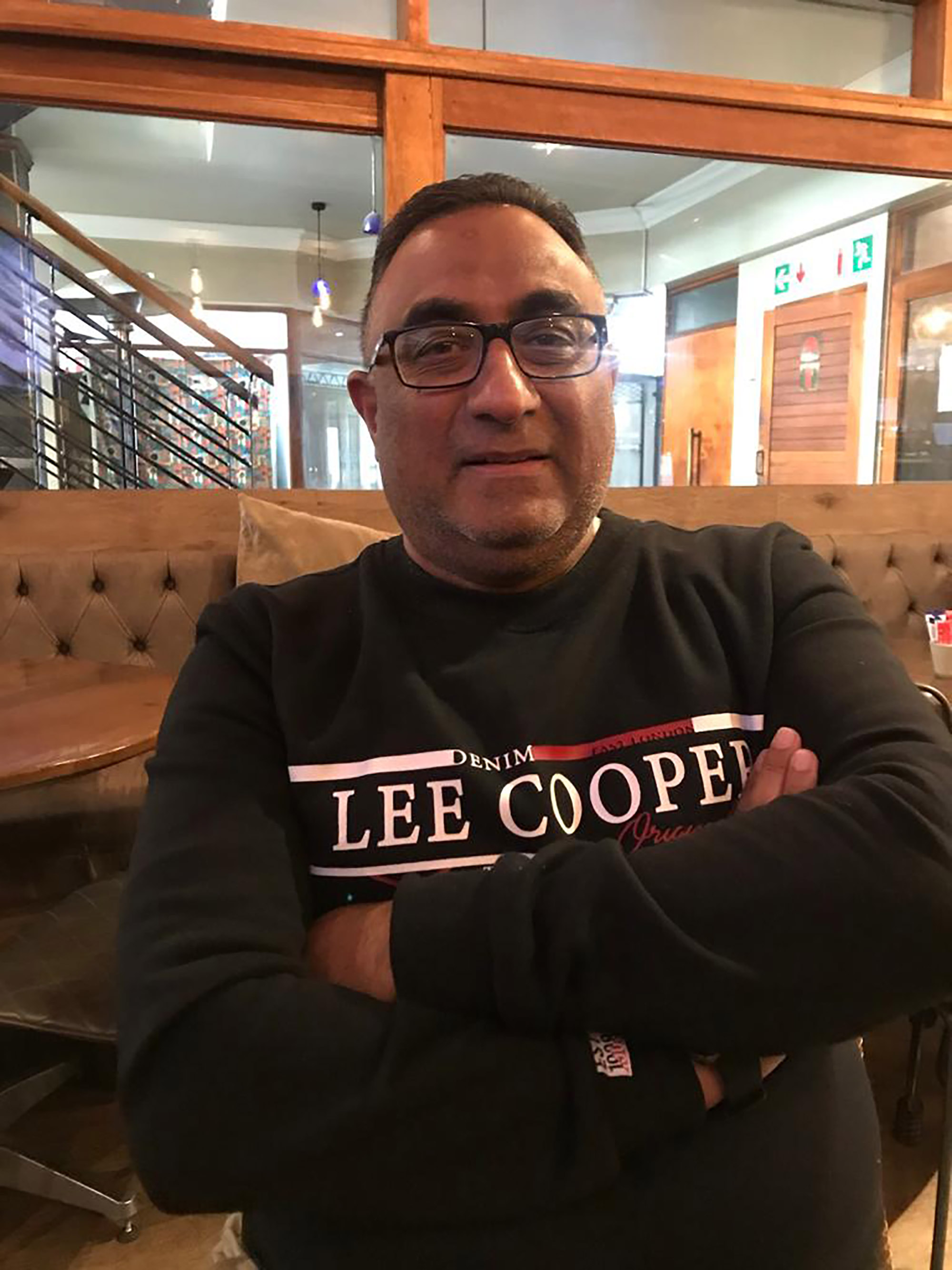
Ash Ramraj on a family holiday in Stellenbosch last week, after returning home safely from Khartoum. (Photo: Supplied)
First signs of strife
Ilse Young and her husband, Adam, have lived in Sudan since 2008. The two met in Khartoum, married and are parents to twin three-year-olds who know Sudan as home. Both moved from the Eastern Cape for work opportunities; Ilse as a French teacher and Adam as a plant manager for DAL Dairy Factory.
April 15 felt like just another ordinary Saturday morning in the nation’s capital – until the RSF began seizing key sites in Khartoum and claiming control of “all air navigation in Sudan” as well as the Presidential Palace.
“Adam was actually out golfing. He was just teeing off and then heard this loud explosion and looked around and in the distance, you could see a huge smoke cloud … and that was the first we heard,” Young said.
“Then we started getting security messages from the various organisations telling us of these attacks.
“The first day, honestly, I just thought they were going to shut down the internet for a few days, and that this was just going to be an annoyance. That’s until you realise what is actually happening. I mean, they were bombing the airport and they were bombing next to people’s houses.”
Ash Ramraj was working in his office in the industrial sector of Khartoum when he heard the explosions. The Durban local is in automobile network development and has worked across Africa. He moved to Khartoum five weeks earlier and lived in an apartment just 2 kilometres from the Presidential Palace.
“I could hear the gunshots and the bombs going off,” Ramraj explained.
“Bullets and shells were coming to the building and it was hit a few times, so we had to take cover. You could hear tanks rolling down the street and bullets flying. I actually made a shelter by putting the base of my mattress against the window and used it to cover me in case there were stray bullets or an attack.”
Planning an escape from Sudan
Both Young and Ramraj were restricted to their homes for the next week. Ramraj’s power went out on Wednesday. Young’s internet was cut on Sunday. And as the violence only grew, so did the urgency to leave the country.
“[Soldiers] were starting to go into buildings, and they would give people an hour’s notice and then attack that building and take it over, or raid a few of the embassy houses … both RSF and SAF guys,” Young said.
“We had a WhatsApp group that was really just an information exchange in the past. And the group became quite big with a lot of South Africans. We were receiving some communication from the embassy, and they were trying to source buses. So when they told us the buses were not arriving yet, we all decided in the interim to go to a building called AK compound.
“Our advice to people was to take what some of the embassies refer to as a ‘go-bag’, which was like a backpack with your passport, a sweater and other basics to fit in an 8 kilogram bag. We packed a warm blanket for the kids, a change of clothes, a few toiletries and some essentials. Our most prized possession was a hard drive with photos on it.”
Ramraj, Young and dozens of others gathered at the AK compound in Khartoum. During this time, Gift of the Givers and Dirco were organising three buses to come to the capital, pick up the South Africans and drive 1,300 kilometres north to Aswan. The first two buses arrived Monday morning and collected 38 South Africans.
“We got to military checkpoints … where you’d be stopped. The soldiers would get in the car to see who’s inside and they checked your bags,” Ramraj said.
“We had to explain that we were just making our way to safety. Those were the first and second checkpoints.
“We were trying to hide our bags beneath the seat so it wasn’t obvious when we did go through a roadblock,” Young said.
“We also got advice to have a mini bag of goods to offer to the soldiers, whether it was RSA or SAF, if they stopped you.
“They were looking for things like men’s clothing, phones they could sell or use, and money. We all had an old phone and even a bottle of water that we could give away.”
Ramraj said: “It took us 18 hours to get to the border.” They were kept waiting at the border for more than 17 hours.
“There are hundreds of buses at the border office … thousands of people. It’s 40 degrees and dirty … dust is flying everywhere. When the border opened at noon, it was complete chaos. Everybody’s running to get their passports stamped and people are being pushed from one end to the other.”
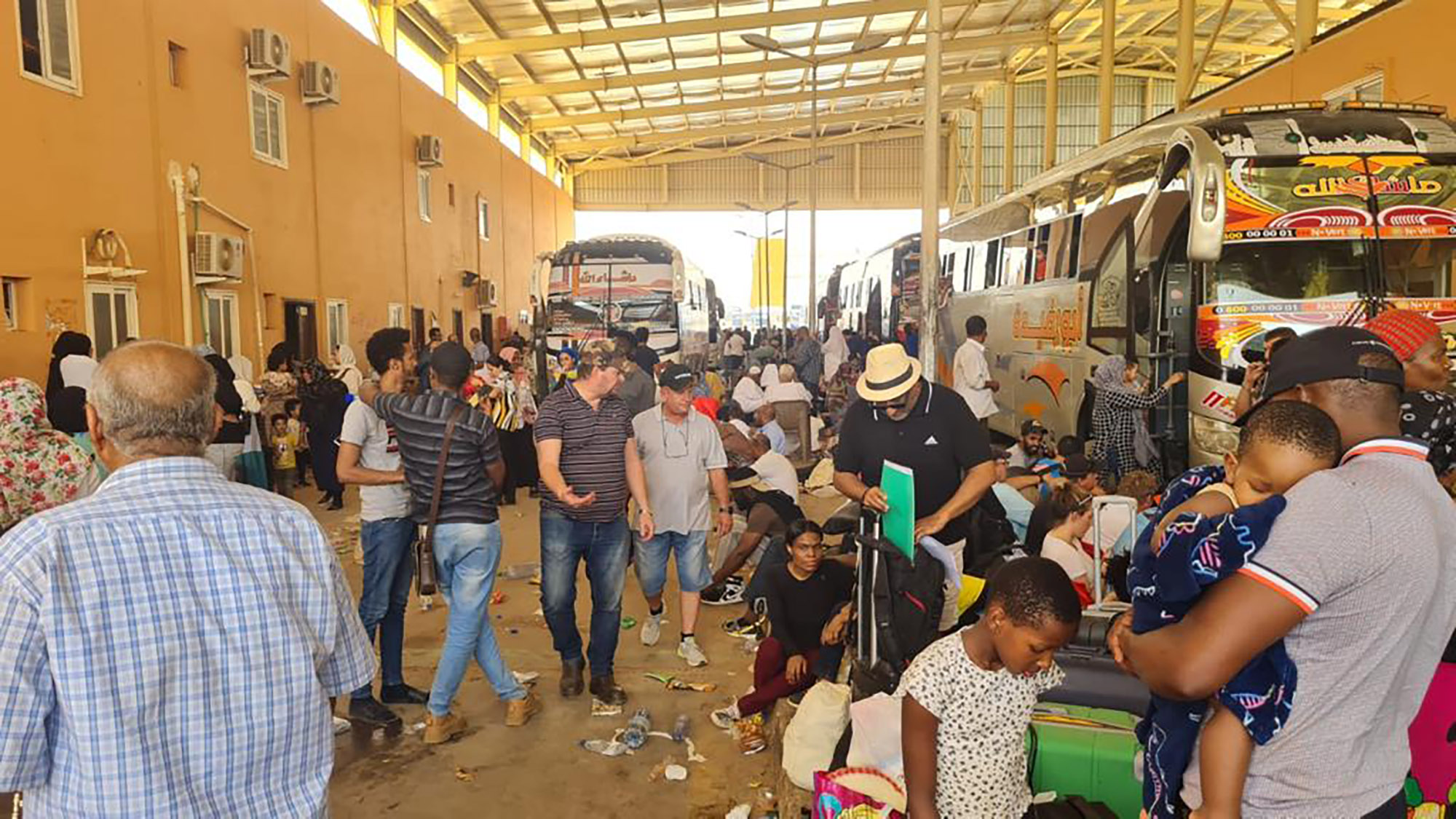
Thousands crowd the border office between Sudan and Egypt, hoping to cross the border into safety. (Photo: Supplied)
Ramraj’s bus arrived at 9am but it took until 5pm on Tuesday to get to the Egyptian side of the border.
“We got all the paperwork done and then had to wait. Eventually, the passports came out at about 1.30am. Unfortunately, my documents didn’t come out.” It took another hour for Ramraj to receive his documents, by which time the others had already left.
Ramraj boarded a local bus and found his way to Aswan.
Flights from Aswan to South Africa began on the night of Saturday, 29 April. South African Special Forces provided a military plane to take the South Africans to Nairobi, where passengers caught commercial flights to Johannesburg.
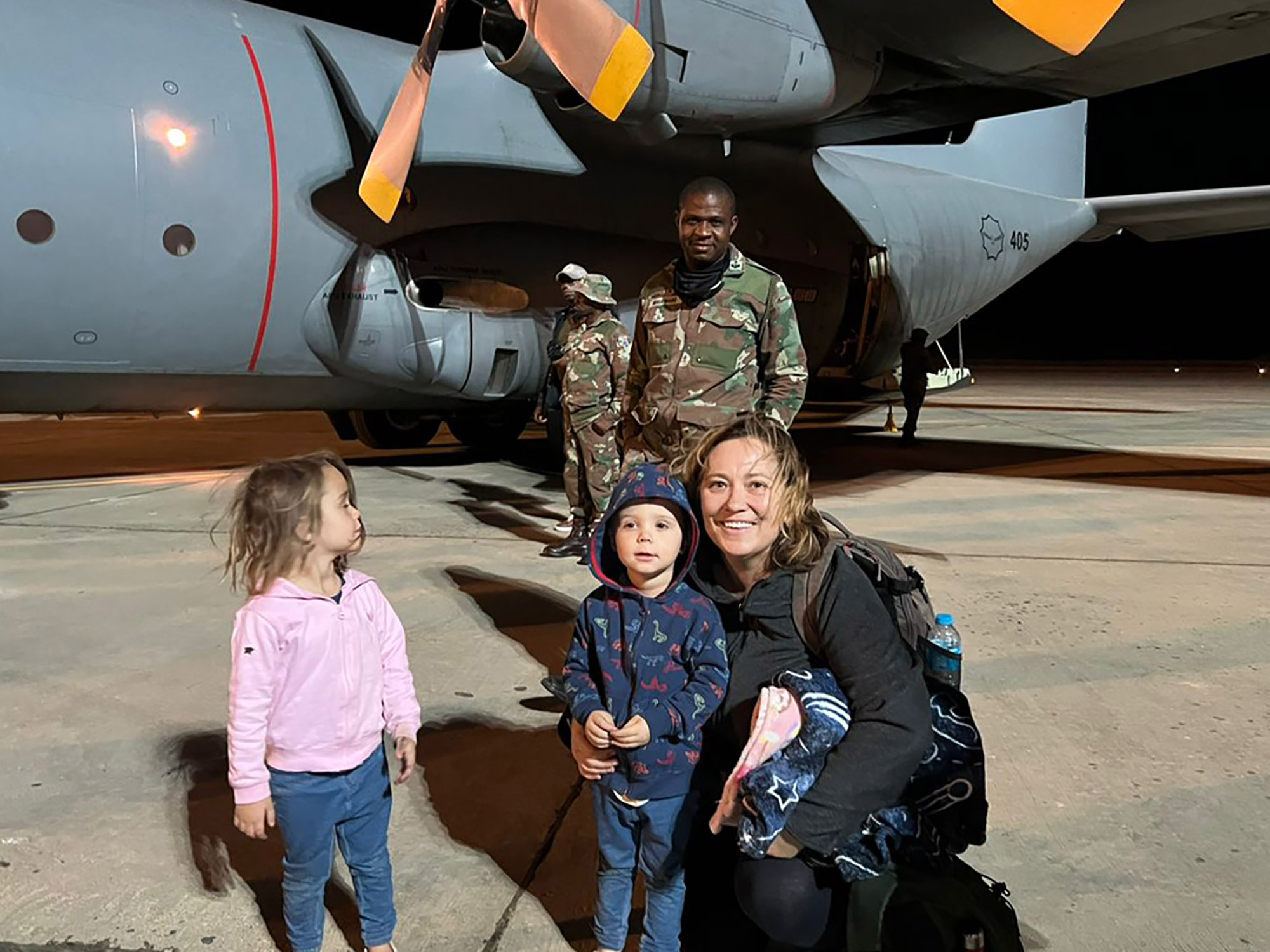
Ilse Young and her two children after disembarking the Special Forces-provided flight from Aswan to Nairobi. Adam Young, not pictured, stayed in Egypt to bring their two dogs across the border. (Photo: Supplied)
Two members of the Young family got left behind in the scramble to escape – their Scottish terriers, Nyala and Isla.
“We realised in the beginning that it wasn’t going to be realistic to fight to bring the dogs with us. Because we have two small children and the dogs, it would be more of a security risk.
“When Dr Imtiaz Sooliman from Gift of the Givers announced he had organised a third bus, I, in desperation, asked him if my dogs could go on that bus – and he agreed. Bless him, because the dogs got to the border.
“The embassy team was not keen on pets, to begin with. They basically said to the American gentleman and South African woman that took care of them on the bus, ‘It’s you or the dogs’.”
With Nyala and Isla stranded at the border, Adam decided to return and rescue them. A border patrol officer was able to send the family a video showing that the dogs were receiving water in the hot desert sun.
Adam spent another two weeks in Egypt before arriving in South Africa with the dogs on 11 May.

Adam Young sits with Isla (left) and Nyala (right) in Cairo, days after rescuing the canine pair from the border of Egypt and Sudan. (Photo: Supplied)
Living in limbo
Both Ramraj and Young found safe refuge back in South Africa, but much of their lives remained behind.
“We’re not certain how much there is to go back to. We’re hoping that our house hasn’t been looted and that there’s still something that we can salvage from there,” said Young.
“The kids’ international school put out a notice that they’re going to try to teach online until the end of the semester.
The South African government condemned the fighting on 15 April, describing it as “disturbing” and calling for “peace and calm among the parties involved in the conflict”. There are no updated travel restrictions to Sudan.
“One minute you’re colouring-in with your kids, and the next minute you hear the fighter jets going overhead and you just put the music up louder so that they don’t hear. I don’t think you want a three-year-old to be able to distinguish between gunfire, bombs and anti-aircraft guns,” said Young.
Although they managed to flee the violence, emotional stress remains. Ramraj says he’s tried counselling to overcome the trauma of the experience, which has caused him sleepless nights.
“You hear any sort of bang and you wonder what could be going on.”
Ramraj is back in Durban with his wife and visiting his daughters in other parts of South Africa. The Young family is staying with relatives in Port Elizabeth.
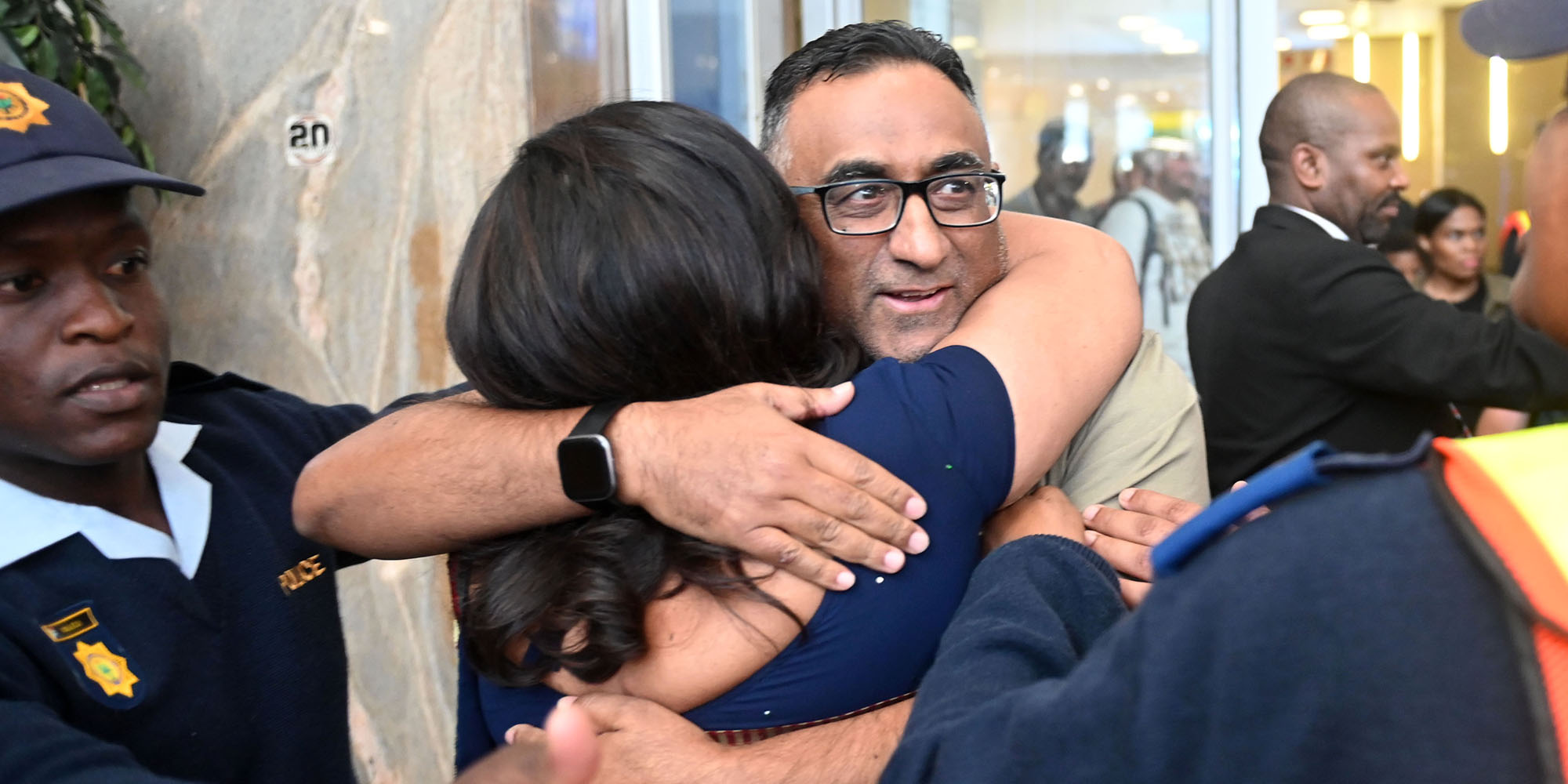
Ash Ramraj, who was trapped in Khartoum in Sudan, is greeted by his sister Anusha Sukhnundan at OR Tambo International Airport in South Africa on 30 April 2023. (Photo: Gallo Images / Beeld / Deaan Vivier)
Both Ramraj and Young said the war did not define Sudan or its people.
“This war is against everything that Sudanese culture stands for. They are the warmest and most heartfelt people,” Young emphasised.
“They don’t deserve what’s happening, but they are resilient.”
source:South Africans describe harrowing escape from war-torn… (dailymaverick.co.za)
-
AuthorPosts
- You must be logged in to reply to this topic.
